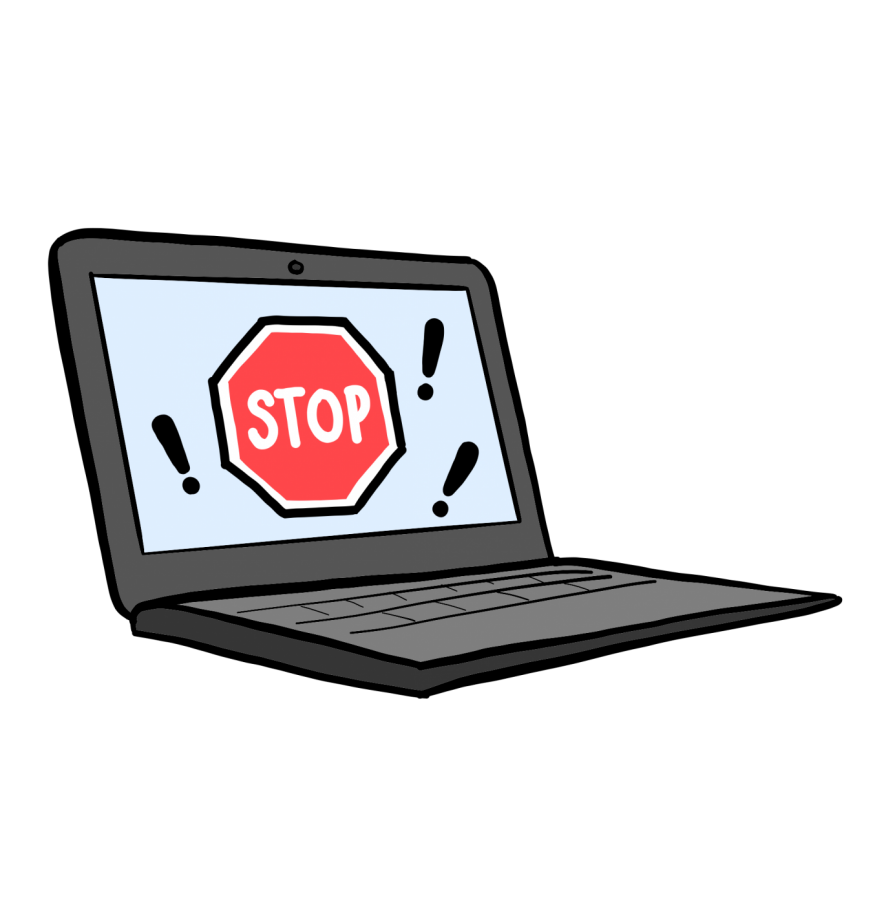Students feel the squeeze with school Wi-Fi restrictions
Trying to visit certain sites on the school Chromebooks only results in the infamous “Website Blocked” screen.
December 12, 2019
If you have ever tried to access certain websites like YouTube, Facebook or Spotify in school, chances are they have been blocked. Many students at RM have encountered this problem, even when visiting sites for educational purposes.
Are web filters in schools necessary? What websites, blogs or social networks have been blocked? How has this affected students’ learning?
Website restrictions first became common when the Children’s Internet Protection Act (CIPA) was signed into law in December 2000. Under this law, schools must have protection measures shielding “both adults and children from visual depictions that are obscene, contain child pornography or are harmful to minors.” Adults, however, have more access to these types of content compared to students.
Thus, MCPS intends to shield its students from websites that promote adult or sexually explicit material, criminal skills, hacking, the use of drugs, alcohol or tobacco, hate speech, violence and weaponry. By implementing software technology, MCPS can sort and evaluate websites according to certain categories deemed inappropriate for minors. The sites are stored in the software’s database, and new, unsuitable sites are categorized and compared to these identified categories.
Even though certain websites may be restricted, teachers can still approve and allow students to access them. Media specialist Michelle Alexander said, “We can approve videos [on YouTube] when we log in, and I think there’s a line there that says, ‘videos not approved’ … So I think when that’s done, you can access it.”
According to MCPS, all websites allowed through the content filter must promote “instructional materials that support the curriculum and the goals of education on a county-wide basis.” These website restrictions are meant for the good of the students, protecting them from dangerous content but allowing them to learn through technology.
“I think part of it is because of their inability to keep you from accessing certain types of information,” Dr. Alexander said. “I do know that I think you could probably get into porn on YouTube, and since they can’t block it out, they just block you.”
Even though MCPS has good intentions, students at RM have found some disadvantages with the website restriction. Freshman Mathias Mulugeta was researching for a school project, but could not access certain videos on YouTube since they were blocked. “I turned in my Youtube form, but there have been some videos which I couldn’t watch, which was kind of weird because I had to use it for my science project. So that took a really big hit,” Mulugeta said.
Junior Gisselle Orellana Vanega had a similar experience with the website filters. “I had to do a project for English, it was the Childhood Liberation Policy, and I wasn’t able to get news and put it on my presentation because it wouldn’t allow me to get on that website. It wouldn’t help my presentation and get it more realistic and persuade people to help out on the policy,” she said.
If students could change something about the restriction, most would unblock websites that have been useful to their academics. Like Mulugeta and Vanegas, many students have tried to visit websites for educational purposes, such as project research or homework, but they feel that website filters have put them at a disadvantage. “I think that, well now that we’re in high school, you don’t really need to be caught or seen being playing games or something like that,” Mulugeta said.
Sometimes, though, the block is merely troublesome and not as impactful on academics. “It hasn’t really affected me personally, but it’s just been inconvenient,” freshman Emily Duan said.
Not everyone is opposed to the limitations on websites. Of the students interviewed, most agreed that certain websites should remain blocked to some extent. “For things like games and stuff it’s kind of helpful because it’s less distracting,” Duan said.
Vanegas also brings up another advantage of the website restrictions. “It depends on what websites you block because some of them are unnecessary, and some of them are necessary. Some websites, I get like they’re not good for students—they’re inappropriate and not good for students to look at,” Vanegas said.
Still, many students have specific appeals as to which websites to allow access to. “Just [don’t] block Sparknotes. Or any like websites that are necessary for students,” sophomore Monica Escalante said. “A lot of people get their notes from Sparknotes, or understand the book they’re reading from Sparknotes.”
Junior Brandon Huynh’s statement may also strike a chord with a number of students. “Unblock Slader,” he said.




